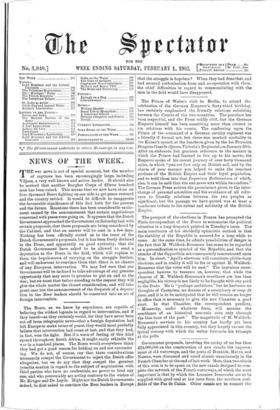Government proposals, involving the outlay of no less than £24,000,000
on the construction of new canals, the improve- ment of old waterways, and the ports of Dunkirk, Havre, and Nantes, were discussed and voted almost unanimously in the French Chamber at the end of last week. More than two-thirds of this sum is to be spent on the new canals designed to com- plete the network of the French waterways, of which the most important is that by which the Lorraine Ironworks are to be supplied with good coal at low rates from the northern coal- fields of the Pas de Calais. Other canals are to connect the Loire and the Rhone, and Marseilles and the Rhone. The last- named scheme is due to the growing commercial rivalry of the Italian ports, the trade of which will be still further developed by the opening of the Simplon Tunnel some eighteen months hence, while the canal from Marseilles to Arles is not expected to be ready for traffic, for eight or ten years. This means, then, that the expenditure will be spread out over 'a consider- able period, while in the case of all minor works the districts, interested are expected to pay half the cost. Still, these facts do not detract from the magnitude of the scheme, or discouet the unanimity with which it has been sanctioned. The German Emperor will probably be the first to admit that Canal Bills are a thing they understand better in France.







































 Previous page
Previous page